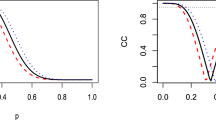Abstract
How can we determine the adequacy of a probabilistic coherence measure? A widely accepted approach to this question besides formulating adequacy constraints is to employ paradigmatic test cases consisting of a scenario providing a joint probability distribution over some specified set of propositions coupled with a normative coherence assessment for this set. However, despite the popularity of the test case approach, a systematic evaluation of the proposed test cases is still missing. This paper’s aim is to change this. Using a custom written computer program for the necessary probabilistic calculations a large number of coherence measures in an extensive collection of test cases is examined. The result is a detailed overview of the test case performance of any probabilistic coherence measures proposed so far. It turns out that none of the popular coherence measures such as Shogenji’s, Glass’ and Olsson’s, Fitelson’s or Douven and Meijs’ but two rather unnoticed measures perform best. This, however, does not mean that the other measures can be rejected straightforwardly. Instead, the results presented here are to be understood as a contribution among others to the project of finding adequate probabilistic coherence measures.

Similar content being viewed by others
References
Akiba, K. (2000). Shogenji’s probabilistic measure of coherence is incoherent. Analysis, 60, 356–359.
BonJour, L. (1985). The structure of empirical knowledge. Cambridge: Harvard University Press.
Bovens, L., & Hartmann, S. (2003). Bayesian epistemology. Oxford: Oxford University Press.
Bovens, L., & Hartmann, S. (2005). Why there cannot be a single probabilistic measure of coherence. Erkenntnis, 63, 361–374.
Brewka, G. (1991). Nonmonotonic reasoning: Logical foundations of commonsense. Cambridge: Cambridge University Press.
Carnap, R. (1950). Logical foundations of probability. Chicago: University of Chicago Press.
Cheng, P. W. (1997). From covariation to causation: A causal power theory. Psychological Review, 104, 367–405.
Christensen, D. (1999). Measuring confirmation. Journal of Philosophy, 96, 437–461.
Crupi, V., Tentori, K., & Gonzales, M. (2007). On Bayesian measures of evidential support: Theoretical and empirical issues. Philosophy of Science, 74, 229–252.
Douven, I., & Meijs, W. (2007). Measuring coherence. Synthese, 156, 405–425.
Eells, E., & Fitelson, B. (2002). Symmetries and asymmetries in evidential support. Philosophical Studies, 107, 129–142.
Finch, H. A. (1960). Confirming power of observations metricized for decisions among hypotheses. Philosophy of Science, 27, 293–307.
Fitelson, B. (2003). A probabilistic theory of coherence. Analysis, 63, 194–199.
Fitelson, B. (2004). Two technical corrections to my coherence measure. http://fitelson.org/coherence2.
Gaifman, H. (1979). Subjective probability, natural predicates and Hempel’s ravens. Erkenntnis, 21, 105–147.
Glass, D. H. (2002). Coherence, explanation, and Bayesian networks. In M. O’Neill, R. F. E. Sutcliffe, C. Ryan, M. Eaton & N. J. L. Griffith (Eds.), Artificial intelligence and cognitive science (pp. 177–182). 13th Irish conference, AICS 2002, Limerick, Ireland, September 2002. Berlin: Springer.
Glass, D. H. (2005). Problems with priors in probabilistic measures of coherence. Erkenntnis, 63, 375–385.
Good, I. J. (1984). The best explicatum for weight of evidence. Journal of Statistical Computation and Simulation, 19, 294–299.
Harris, A., & Hahn, U. (2009). Bayesian rationality in evaluating multiple testimonies: Incorporating the role of coherence. Journal of Experimental Psychology: Learning, Memory, and Cognition, 35(5), 1366–1373.
Jekel, M., & Koscholke, J. (2013). An empirical study of coherence assessment (unpublished manuscript).
Joyce, J. (2008). Bayes’ theorem. http://plato.stanford.edu/archives/fall2008/entries/bayes-theorem/.
Kemeny, J., & Oppenheim, P. (1952). Degrees of factual support. Philosophy of Science, 1952, 307–324.
Keynes, J. (1921). A treatise on probability. London: Macmillan.
Kuipers, T. A. F. (2000). From instrumentalism to constructive realism. Dordrecht: Reidel.
Levi, I. (1962). Corroboration and rules of acceptance. British Journal for the Philosophy of Science, 13, 307–313.
Meijs, W. (2005). Probabilistic measures of coherence. PhD thesis, Erasmus University, Rotterdam.
Meijs, W. (2006). Coherence as generalized logical equivalence. Erkenntnis, 64, 231–252.
Meijs, W., & Douven, I. (2005). Bovens and Hartmann on coherence. Mind, 114, 355–363.
Moretti, L., & Akiba, K. (2007). Probabilistic measures of coherence and the problem of belief individuation. Synthese, 154, 73–95.
Mortimer, H. (1988). The logic of induction. Paramus: Prentice Hall.
Nozick, R. (1981). Philosophical explanations. Oxford: Clarendon.
Olsson, E. J. (2002). What is the problem of coherence and truth? The Journal of Philosophy, 94, 246–272.
Olsson, E. J. (2005). Against coherence: Truth, probability and justification. Oxford: Oxford University Press.
Olsson, E. J. (2013). Coherentist theories of epistemic justification. http://plato.stanford.edu/entries/justep-coherence/.
Popper, K. R. (1954). Degree of confirmation. British Journal for the Philosophy of Science, 5, 143–149.
Rescher, N. (1958). Theory of evidence. Philosophy of Science, 25, 83–94.
Rescher, N. (1973). The coherence theory of truth. Oxford: Oxford University Press.
Rips, L. J. (2001). Two kinds of reasoning. Psychological Science, 12, 129–134.
Roche, W. (2013). Coherence and probability: A probabilistic account of coherence. In M. Araszkiewicz & J. Savelka (Eds.), Coherence: Insights from philosophy, jurisprudence and artificial intelligence (pp. 59–91). Dordrecht: Springer.
Schippers, M. (2014). Probabilistic measures of coherence: From adequacy constraints towards pluralism. Synthese, 191(16), 3821–3845.
Schupbach, J. N. (2011). New hope for Shogenji’s coherence measure. British Journal for the Philosophy of Science, 62(1), 125–142.
Shogenji, T. (1999). Is coherence truth conducive? Analysis, 59, 338–345.
Shogenji, T. (2012). The degree of epistemic justification and the conjunction fallacy. Synthese, 184, 29–48.
Siebel, M. (2004). On Fitelson’s measure of coherence. Analysis, 64, 189–190.
Siebel, M. (2005). Against probabilistic measures of coherence. Erkenntnis, 63, 335–360.
Siebel, M., & Wolff, W. (2008). Equivalent testimonies as a touchstone of coherence measures. Synthese, 161, 167–182.
Tentori, K., Crupi, V., Bonini, N., & Osherson, D. (2007). Comparison of confirmation measures. Cognition, 103, 107–119.
Acknowledgments
I would like to thank Michael Schippers and Mark Siebel for helpful comments or discussion. This work was supported by grant SI 1731/1-1 to Mark Siebel from the Deutsche Forschungsgemeinschaft (DFG) as part of the priority program “New Frameworks of Rationality” (SPP 1516).
Author information
Authors and Affiliations
Corresponding author
Rights and permissions
About this article
Cite this article
Koscholke, J. Evaluating Test Cases for Probabilistic Measures of Coherence. Erkenn 81, 155–181 (2016). https://doi.org/10.1007/s10670-015-9734-1
Received:
Accepted:
Published:
Issue Date:
DOI: https://doi.org/10.1007/s10670-015-9734-1




